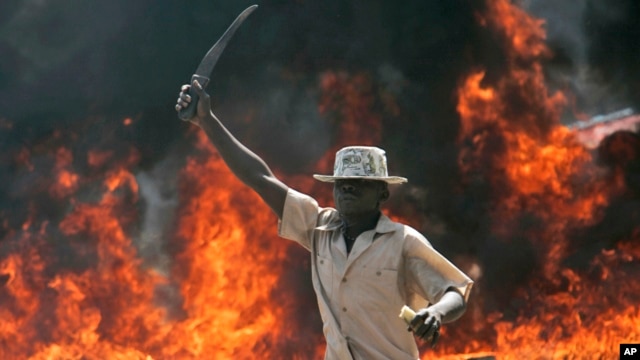
NAIROBI — Civil society group Kenyans for Peace with Truth and Justice (KPTJ), has launched a report entitled “Securing Justice.” The report calls for the Kenyan government to set up a tribunal to try those who were directly involved in attacking people during the country's 2008 post-election violence.
Speaking in Nairobi at the launch of the report, Kenyans for Peace with Truth and Justice coordinator Carole Theuri, said there is a need to set a local tribunal to try the middle- and lower-level perpetrators of the 2008 violence.
“Victims are real and present. They are not something that should be forgotten and you have to remember most of them know who the perpetrators are and nothing has been done. I think it is a grave injustice to be able to look at the development of the country without looking into the development of the people and even their psychological status,” Theuri stated.
The results of Kenya’s presidential election in late 2007 were hotly disputed. The bitterness sparked inter-communal fighting in which more than 1,100 people were killed and more than 600,000 displaced from their homes.
Only three Kenyans: President Uhuru Kenyatta, his deputy William Ruto and former radio host Joshua Sang - are facing charges of orchestrating the violence. All three face trial at the International Criminal Court.
Theuri said hundreds of other perpetrators of serious crimes continue to evade accountability. “How would you feel if every day to work with somebody who you know stole your goods or hacked your loved one? I think that definitely needs to be accountability and justice for those victims," she asserted. "That is why we are looking into try to see how this can be done with the current context we have.”
The Rift Valley region was the epicenter of ethnic clashes between Kalenjin and Kikuyu youths who attacked each other. Today the political landscape has changed, the government is headed by a Kikuyu president and a Kalenjin deputy president.
International Center for Transitional Justice deputy director Njonjo Mue said tribal political alliances do not stop some victims from seeking to have their attackers prosecuted.
“Even if it was the case that two communities now agreed to work together, individual victims still seek justice and individual victims are represented at the ICC. They have lawyers who are at the ICC and these lawyers are continuously engaged," Mue noted.
The Kenyan government has pressured the ICC to drop the cases against President Kenyatta and Deputy President Ruto. The court has declined to do so, but said this week that portions of Ruto's trial may take place in Kenya or neighboring Tanzania.
|
|
